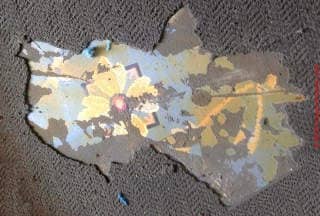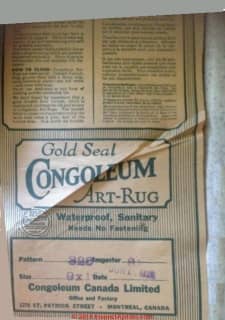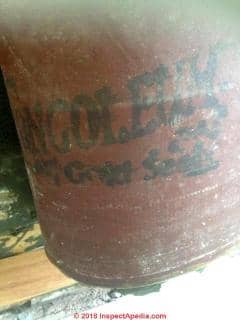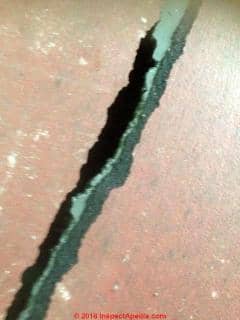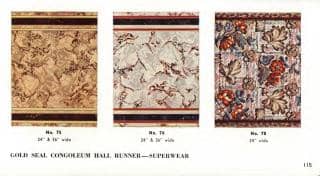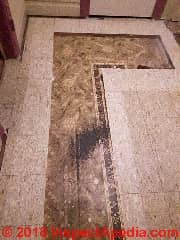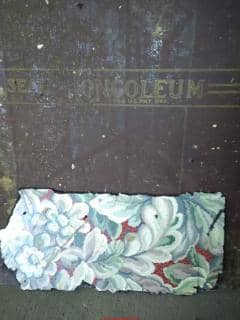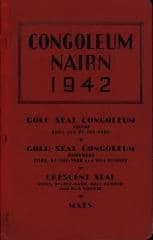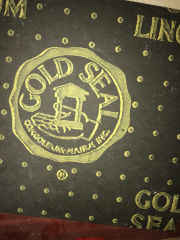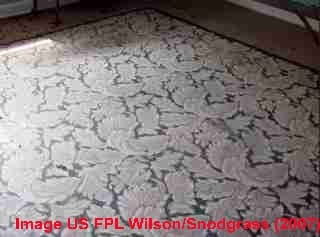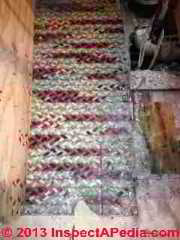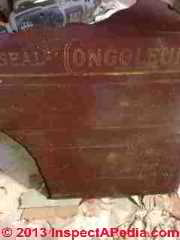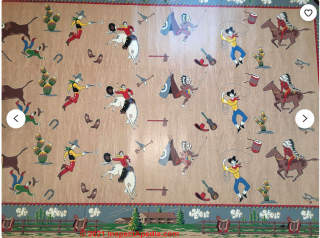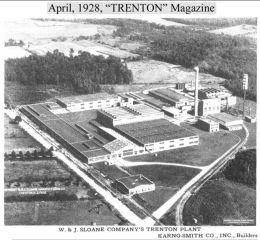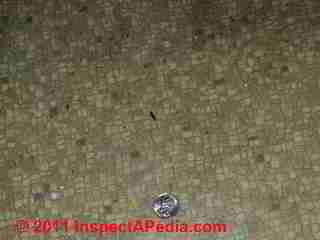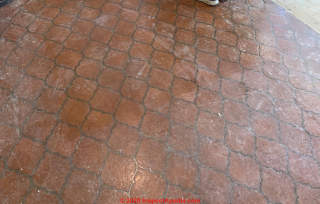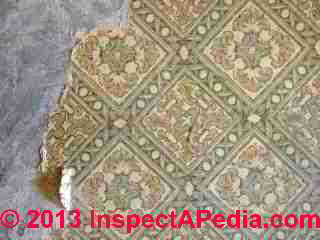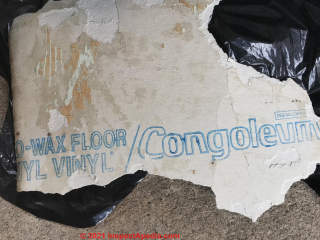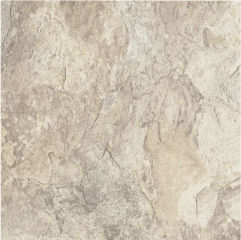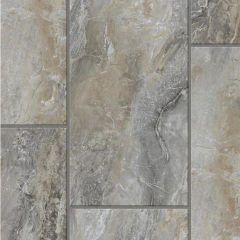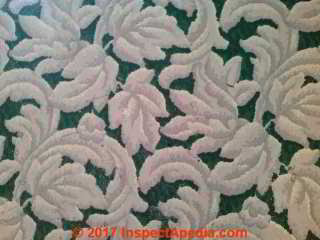 Illustrated History of Congoleum Nairn Flooring
Illustrated History of Congoleum Nairn Flooring
Photo examples help date Congoleum-Nairn flooring, ingredients, history
- POST a QUESTION or COMMENT about the history & asbestos content of Congoleum-Nair floor coverings
History of Congoleum Nairn flooring with a photo-guide to examples of Congoleum Nairn flooring from each decade.
We include links to Congoleum Nairn flooring catalogs giving more examples of the company's flooring offerings throughout its history.
Page top photo: a popular Congoleum rug floor covering or "linoleum" installed in a U.S. home in 1949.
This article series describes the history of resilient floor tiles and sheet flooring, including the production and ingredients in asphalt-based floor tiles and vinyl-asbestos floor tiles.
We list companies producing floor coverings along with historic dates and types of products manufactured.
InspectAPedia tolerates no conflicts of interest. We have no relationship with advertisers, products, or services discussed at this website.
- Daniel Friedman, Publisher/Editor/Author - See WHO ARE WE?
Congoleum-Nairn Flooring History, Use, Components - 1886 - Present
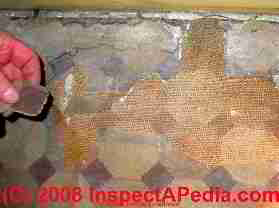 This article gives the origins, history, production, and ingredients of Congoleum / Congoleum-Nairn flooring products.
This article gives the origins, history, production, and ingredients of Congoleum / Congoleum-Nairn flooring products.
[Click to enlarge any image]
At the end of this article you will find a list of guides to identify different types of floor coverings, sheet flooring, linoleum, Armstrong flooring, Congoleum rugs, sheet flooring, tiles, and other floor tiles that may contain asbestos.
1828: Michael Nairn, a sail maker, began a heavy-canvas sailcloth business in Kirkaldy, Scotland. According to modern day Congoleum's own history (cited below), Narin sold his fabric to other manufacturers who used it to produce floor coverings.
1847: Nairn was producing his own painted "linoleum" floor coveings after licensing a patent from Frederick Walton, the inventor of "linoleum".
1858: Michaeel Nairn dies. His family continue to operate the business.
1877: Nairn's Floorcloth or "linoleum" adopted the name, patented by Walton, that had now become generic; Walton's patent expired in this year. Nairn's Kirkady Scotland plant was the world's largest producer of linoleum.
1886: Congoleum Nairn U.S. was founded by Michael Nairn, Kearney New Jersey in 1886 (the same year my grandfather Louis Friedman arrived at Ellis Island from Yoniver, Lithuania), originally produced painted floor-cloth coverings using sailcloth.
In this decade Nairn expanded operations out of Scotland into the U.S., England, France, and Germany.
The company produced forms of linoleum backed by fabric including burlap-like fabrics. Later products include those using a backer of asphalt-impregnated felt.
See examples of CONGOLEUM - NAIRN CORPORATION FLOORING in this web article, with photos from the 1920's to 2003.
See an example photo above-left and discussed at the top of our building age determination article:
FLOORING MATERIALS, Age, Types - Note that this antique flooring may not be a Congoluem-Nairn product).
According to Congoleum-Nairn, Linoleum, the precursor of modern resilient floors, was a hard smooth-surfaced flooring made of solidified linseed oil and ground cork, adhered to a backing of canvas or burlap such as that shown in our example.
1902: The name "Congoleum" is ascribed to its use by United Roofing and Manufacturing Co., located in Eri PA, who named their roofing product "Congo" roofing after the source of asphalt it was using - shipped from the African Congo. By 1903 United Roofing had expanded their products into asphalt-based sheet flooring - "Congoleum".
1919 Congoleum Art Rugs: According to some sources, by 1919 Congoleum Art Rugs were in popular demand but the company's website history indicates that it was in the 1920's that Nairn joined with Congoleum (whose asphalt-based raw materials originated in the Belgian Congo) in the 1920's to produce Congoleum, a three-foot wide simulated wood grain floor covering product, and to produce linoleum - Congoleum Gold Seal Rugs and Nairn Linoleum into the 1930's.
See this 1928 CONGOLEUM RUGS SHEET FLOORING - a Canadian Congoleum art rug installed in a home in Nova Scotia.
1928: Congoleum in Canada
[Click to enlarge any image]
InspectApedia.com reader Jennifer McKenna contributed these photographs of Canadian-made a Congoleum Rug along with documentation that included a date samp of 1 June 1928.
Congoleum Canada, Office & Factory, 1270 Patric St., Montreal, Canada. Photo below includes the date stamp.
This is a traditional red-backed Congoleum Gold-Seal flooring product, as you'll see in the photos. We're hopeful that Ms. McKenna will scrape off more of that old carpet padding to show us the Canadian Congoleum rug pattern in more detail.
1930: asphalt & red-backed Congoleum Gold Seal Rugs and Nairn Linoleum were sold into the 1930's until replaced by vinyl-based products.
1935: Congoleum vinyl flooring research: In the 1930's Congoleum-Nairn was researching vinyl flooring, a product whose use grew rapidly after 1945.
I [DF] speculate that while asbestos was in some asphalt-impregnated paper backers on flooring products, asbestos formed a still-higher proportion of light-colored backer found on vinyl flooring products made in the 1950's and later.
Above and below: popular Congoleum Nairn floor runner "rugs"
...
Tests of the Congoleum Gold Seal flooring above did not detect asbestos.
1941-1942: Congoleum Gold Seal Rugs & Congoleum Nairn Linoleum continue in popularity
Clicking the image above will display this 1942 Congoleum Nairn flooring catalog as a PDF file. Above: a Congoleum Nairn Gold Seal Rug logo imprint from a 1942 Congoleum Rug.
CONGOLEUM NAIRN 1942 SHEET FLOORING CATALOG [PDF] 124 pages. including Gold Seal Congoleum Deluxe "rugs by the yard", Gold seal Congoleum "Superwear" and Congoleum Nairn Crescent Seal and Mats, retrieved 2018/02/07,
original source: https://ia802507.us.archive.org/15/items/CongoleumNairn1942/CongoleumNairn19420001.pdf Digitized and preserved by AAPI and from Tulane University archives.
You will see that very ornate "rug" patterns were provided in this product series.
See details
at 1940s CONGOLEUM GOLD SEAL RUGS vs. NAIRN LINOLEUM ingredient differences
1947: Congoleum flooring may contain asbestos
Above: a Congoleum flooriing rug in its popular floral pattern, from a 1949 installation in a U.S. home.
Congoleum Nairn tile flooring and resilient flooring or linoleum flooring photos wanted - CONTACT US
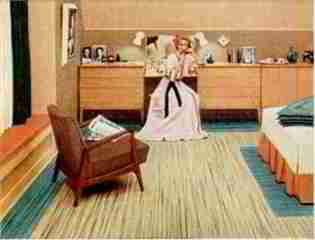 1950: Congoleum linoleum sheet flooring: by the 1950s Congoleum-Nairn were producing twelve-foot wide sheet flooring or modern "linoleum" and the company produced the Vinylbest™ vinyl asbestos floor tile series.
1950: Congoleum linoleum sheet flooring: by the 1950s Congoleum-Nairn were producing twelve-foot wide sheet flooring or modern "linoleum" and the company produced the Vinylbest™ vinyl asbestos floor tile series.
By 1955, the Congoleum Gold Seal inlaid linoleum flooring shown here, Gold Seal Inlaid Linoleum "Fashion Floor" was featured in Life and other magazine advertisements as both sheet flooring and 9" x 9" floor tiles.
Watch out: Backing used on some vinyl flooring products may contain asbestos.
Other Congoleum products included Vinylfloor, Vinyltop (countertops), Congoleum, CongoWall, Ranchtile, Cork tile, Linoleum tile, Vinyl tile, Rubber tile, and Asphalt tile marketed under the Congoleum Gold Seal trademark.
The Congoleum Sequin Pattern [image] sheet linoleum provided a scattershot or color fleck pattern.
Really? Some tests of 1950s Congoleum sheet flooring found no asbestos:
The Congoleum rug pattern shown below was tested for asbestos.
The asbestos test lab did not find asbestos in this floor.
1950: Congoleum Flooring Asbestos
Several sources list Congoleum flooring manufactured at the company's various factories between 1947 and 1983 as containing asbestos. And that's likely be true.
Really? tests of at least some Congoleum floor samples did not find asbestos.
at 1950 CONGOLEUM GOLD SEAL SHEET FLOORING - No Asbestos was found in some 1950 floor covering products tested.
1951: Congoleum Nairn products & mergers
In 1951 Congoleum Nairn purchased Delaware Floor Products, a Wilmington DE vinyl product manufacturer thowe line included asphalt-impregnated felt backed flooring.
Above, a 1950s Sloane-Blabon linoleum rug, courtesy of an InspectApedia.com reader.
1953: Congoleum Nairn buys Sloane-Blabon
In 1953 Congoleum Nairn purchased Sloane-Blabon Corporation, by then a long-establilshed floor covering manufacturer, for $10.3 million.
Sloane-Blabon's factory was in Trenton, New Jersey where it had been in operation at least since the 1920s. [Photo below]
By 1957, probably consolidating in light of the shift from traditional "linoleum sheet flooring to vinyl-based tile and sheet flooring products, the company had moved its linoleum production entirely to the Sloane-Blabon factory.
See details at SLOANE-BLABON FLOORING HISTORY
See more examples
at ASBESTOS FLOOR TILE IDENTIFICATION PHOTOS 1949-1959 - includes more Images of Congoleum Nairn produced vinyl asbestos floor tiles in patterns and shades including examples
1955: Congoleum-Nairn purchases Patchogue-Plymouth's fibre-rug division
This addition to the company's stable put Congoleum-Nairn into the woven fiber & fabric rug business; the company also made carpeting used in vehicles.
1960: Congoleum Flooring Catalog
The chip flooring pattern shown above, discussed in detail at 1960's CONGOLEUM FLOORING - was tested and reported to contain no asbestos.
Congoleum Vinylbest vinyl asbestos floor tiles were produced in the 1950s along with Congoleum Gold Seal inlaid linoleum flooring shown at above left from a Life magazine advertisement, and the Congoleum sheet linoleum shown in a Florida Home (left) provided a scattershot or color fleck pattern.
The Congoleum linoleum photograph shown here of Congoleum sheet flooring installed in a 1949 Tampa Florida home is provided courtesy of M.B. [We think the flooring itself dates from the 1960's.]
M.B. placed a U.S. quarter on the flooring to provide a pattern size scale reference.
Other 1960's Congoleum products included Vinylfloor, Vinyltop (countertops), Congoleum, CongoWall, Ranchtile, Cork tile, Linoleum tile, Vinyl tile, Rubber tile, and Asphalt tile marketed under the Congoleum Gold Seal trademark.
See 1960's CONGOLEUM FLOORING - Congoleum Sheet Vinyl Flooring, 1960's: some samples were Tested, finding No Asbestos
1971: Congoleum flooring example - shown below
See 1970's CONGOLEUM FLOORING - Congoleum Sheet Flooring, 1970's Asbestos Content, and
See 1970's CONGOLEUM FLOORING in AUSTRALIA - Congoleum Sheet Flooring Backer Text - Australia 1970's - Asbestos?
1982: Asbestos found in this Congoleum Flooring
The 1982 white-backed Congoleum flooring shown above was tested for asbestos - confirming asbestos in this product.
This floor is discussed in detail
at CONGOLEUM-NAIRN FLOOR TILES & LINOLEUM
1993: Congoleum-Amitco venture: In 1993 Congoleum-Nairn formed a joint venture with Amtico Floors, also a manufacturer of resilient floor tiles.
2000: Congoleum White Shield Backing Linoleum
Modern Congoleum flooring using a "White Shield" backing does not contain asbestos, but earlier versions of this product did.
See details at WHITE SHIELD® BACKING ASBESTOS in FLOORING - in older but not modern Congoleum flooring
2003: Congoleum bankruptcy: in response to liability from asbestos hazard or injury claims, Congoleum Nairn filed for bankruptcy under Chapter 11 on 31 Decembver 2003.
2010: Congoleum emerges from bankruptcy: the bankruptcy court approved Congoleum's reorganization plan by mid 2010.
Details about the Congoleum Trust formed to address asbestos-related claims can be found under Congoleum in our alphabetical listing
at ASBESTOS PRODUCING COMPANIES & TRUSTS
There you'll read that the principal asbestos exposure from Congoleum products was of people working in construction and remodeling in residential and commercial buildings.
2012: Congoleum flooring example
The 2012 Congoleum DuraStone HPF flooring shown here would not contain asbestos. These 2012 Congoleum flooring samples are from a Lowes building supply store.
See CONGOLEUM DuraStone HPF FLOORING BROCHURE 2012 [PDF] and product specifications, Congoleum Corporation, P.O. Box 3127, Mercerville, NJ 0861 USA, Tel: 609-584-3000 Website: www.congoleum.com
2013: Congoleum does not contain asbestos
CONGOLEUM AIRSTEP INSTALLATION INSTRUCTIONS [PDF] (2013), Congoleum, 3500 Quakerbridge Road, PO BOx 3127, Mercerville NJ 08619 USA, Website: www.congoleum.com, retrieved 2016/04/01, original source: http://www.congoleum.com/uploads/files/dri_installation_guides/AirStep%20Install%20Instructions.pdf - Notice: these instructions warn about older in-place flooring that may contain asbestos fibers.
Excerpt: Unless positively certain that the in-place product is a non-asbestos containing material, you must presume it containsasbestos. Regulations may require that the material be tested to determine asbestos content and may govern removal and disposal of material.
2018: Congoleum continues to produce a wide range of residential and commercial sheet flooring and floor tile products, made in the U.S. at the corporation's factory in Trenton, NJ.
2021: See also this history of Congoleum Flooring provided by the company
- HISTORY of CONGOLEUM FLOORING [PDF] 1828 - 2016, provided by Congoleum, retrieved 2020/12/17 Congoleum Corporation, Department C, P.O. Box 3127 Mercerville, NJ 08619-0127 USA, Tel: 609) 584-3601, original source: https://www.congoleum.com/history/
- Contact: Congoleum Corp.
3705 Quakerbridge Road
P.O. Box 3127
Mercerville, New Jersey 08619-0127
U.S.A.
Tel: (609) 584-3000
Web: http://www.congoleum.com
Website excerpt:
Since 1886 Congoleum has been committed to developing innovative flooring products that push the industry forward. ...
Congoleum manufactures residential and commercial resilient products that are engineered with state-of-the-art manufacturing equipment and that demonstrate Congoleum`s styling and design leadership. Congoleum has plans for a successful future that includes enhanced products and styles that will show off our true flooring expertise.
Details about Congoleum Nairn flooring and identification photos, catalogs, and more details are
at CONGOLEUM-NAIRN FLOOR TILES & LINOLEUM
Additional Images of Congoleum linoleum sheet flooring products are
at LINOLEUM & Other Sheet Flooring
More Images of Congoleum Nairn produced vinyl asbestos floor tiles in patterns and shades including examples shown
at ASBESTOS FLOOR TILE IDENTIFICATION PHOTOS 1949-1959
Congoleum Nairn flooring and asphalt or vinyl tile flooring photos wanted - CONTACT US.
...
Continue reading at CONGOLEUM-NAIRN FLOORING - home, or select a topic from the closely-related articles below, or see the complete ARTICLE INDEX.
Or see these
Recommended Articles
- ASBESTOS FLOOR TILE PRODUCT NAMES - floor tile and sheet flooring brands and companies
- ASBESTOS FLOORING IDENTIFICATION GUIDE INDEX - all brands, all years - key to identifying flooring
- ASBESTOS TESTING LAB LIST
- CONGOLEUM-NAIRN FLOORING - home
- 1928 CONGOLEUM RUGS SHEET FLOORING - Canadian Congoleum
- 1940s CONGOLEUM FLORAL RUG PATTERNS
- 1947 CONGOLEUM SHEET FLOORING
- 1940s CONGOLEUM GOLD SEAL RUGS vs. NAIRN LINOLEUM ingredient differences
- 1950 CONGOLEUM GOLD SEAL SHEET FLOORING - No Asbestos
- 1950's CONGOLEM SHEET FLOORING Products Resembling Individual Floor Tiles
- 1960's CONGOLEUM FLOORING - No Asbestos
- 1970's CONGOLEUM FLOORING
- 1970's CONGOLEUM FLOORING in AUSTRALIA
- 1980 CONGOLEUM NO-WAX SHEET FLOORING - With Asbestos-Content.
- WHITE SHIELD® BACKING ASBESTOS in FLOORING - in older but not modern Congoleum flooring
- CONGOLEUM FLOORING HISTORY
- DOES THIS FLOOR CONTAIN ASBESTOS? - 5 easy questions to tell if your FLOOR probably contains asbestos -
- FLOOR TILE HISTORY & INGREDIENTS - home, history & types of floor tiles
- FLOOR TILE / SHEET FLOORING PHOTO GUIDES
- FLOOR TYPES & DEFECTS - home
- IDENTIFY SHEET FLOORING TYPE, HOW TO - identify all types of sheet flooring & flooring backers by type, with or without asbestos
- LINOLEUM & OTHER SHEET FLOORING - includes additional Images of Congoleum linoleum sheet flooring products
- RESILIENT SHEET FLOORING ID GUIDE
Suggested citation for this web page
CONGOLEUM FLOORING HISTORY at InspectApedia.com - online encyclopedia of building & environmental inspection, testing, diagnosis, repair, & problem prevention advice.
Or see this
INDEX to RELATED ARTICLES: ARTICLE INDEX to ASBESTOS HAZARDS
Or use the SEARCH BOX found below to Ask a Question or Search InspectApedia
Ask a Question or Search InspectApedia
Try the search box just below, or if you prefer, post a question or comment in the Comments box below and we will respond promptly.
Search the InspectApedia website
Note: appearance of your Comment below may be delayed: if your comment contains an image, photograph, web link, or text that looks to the software as if it might be a web link, your posting will appear after it has been approved by a moderator. Apologies for the delay.
Only one image can be added per comment but you can post as many comments, and therefore images, as you like.
You will not receive a notification when a response to your question has been posted.
Please bookmark this page to make it easy for you to check back for our response.
IF above you see "Comment Form is loading comments..." then COMMENT BOX - countable.ca / bawkbox.com IS NOT WORKING.
In any case you are welcome to send an email directly to us at InspectApedia.com at editor@inspectApedia.com
We'll reply to you directly. Please help us help you by noting, in your email, the URL of the InspectApedia page where you wanted to comment.
Citations & References
In addition to any citations in the article above, a full list is available on request.
- [1] EPA, U.S. Environmental Protection Agency, Asbestos in Your Home, web search 08/31/2011, original source: www.epa.gov/asbestos/pubs/ashome.html
- [2] EPA Guidance for Controlling Asbestos-Containing Materials in buildings, NIAST, National Institute on Abatement Sciences & Technology, [republishing EPA public documents] 1985 ed., Exposure Evaluation Division, Office of Toxic Substances, Office of Pesticides and Toxic Substances, U.S. Environmental Protection Agency, Washington,D.C. 20460
- [3] EPA: "Asbestos Management", U.S. Environmental Protection Agency, Region 7, original author: Todd H. Dresser, Environmental Engineer, (formerly of), Burlington Board of Health, 29 Center Street, Burlington, MA 01803, web search 3/4/2012 original source: epa.gov/region07/education_resources/teachers/ehsstudy/ehs2.htm, [copy on file as: /hazmat/Asbestos Management _ Region 7 _ US EPA.pdf ]
- [4] US EPA, DECONSTRUCTION - BUILDING DISASSEMBLY AND MATERIAL SALVAGE - THE RIVERDALE CASE STUDY [PDF] U.S. EPA, web search 3/4/12, original source: epa.gov/wastes/conserve/rrr/imr/cdm/pubs/river.pdf, [copy on file as: /hazmat/Deconstruction_Riverdale_EPA.pdf]
- [5] TOXICS INFORMATION SERIES: ASBESTOS [PDF], U.S. EPA, April 1980
- [6] EVER WEAR TILE CO is currently (2009) in the Terrazzo, Tile, Marble, and Mosaic Work industry in Fallon, NV. 775) 423-6221. [We do not know the company history nor whether there is an association with EverWear vinyl asbestos floor tiles discussed in this article.]
- [7] HISTORY OF ASBESTOS IN THE UK - THE STORY SO FAR ..., Silverdell PLC, 14 Buckingham St., London WC2N 6DF TelP 0207 389 6906, email: info@silverdell.plc.uk website: www.silverdell.plc.uk. Web search 3/4/12, original source: issuu.com/silverdell_plc/docs/silverdell_history_of_asbestos_article
- [8] Armstrong ® Residential Flooring - Website 05/15/2010 https://www.armstrongflooring.com/ lists current flooring products provided by the Armstrong Corporation, including Armstrong's current vinyl floor tile products at https://www.armstrongflooring.com/flooring/products/vinyl-floors
- [9] Armstrong Corporation, Corporate History - https://www.armstrongflooring.com/corporate/corporate-history.html - Web Search 05/19/2010
- [10] Armstrong vinyl asbestos floor tiles: photos of asbestos floor tiles as catalog pages (PDF form) are at www.asbestosresource.com/asbestos/tile.html
- [11] Thanks to Armstrong Corporation (800-356-9301) for providing information about the dates of manufacture of peel-and-stick floor tiles, email July 2010
- [12] "Asbestos in your home or at work," Forsyth County Environmental Affairs Department, Winston-Salem NC 12/08
- [13] "Asbestos Floor Tile Removal", the University of Minnesota's advice on removing VAT (vinyl asbestos or asphalt asbestos floor tile) can be read in detail at www.health.state.mn.us/divs/eh/asbestos/floortile/index.html
- [14] ASBESTOS IN YOUR HOME U.S. EPA, Exposure Evaluation Division, Office of Toxic Substances, Office of Pesticides and Toxic Substances, U.S. Environmental Protection Agency, Washington,D.C. 20460
- [15] Resilient Floor Covering Institute, 1030 15th St. NW, suite 350, Washington D.C.
- [16] Congoleum Corporation, "Company History", Congoleum Corporation, Department C, P.O. Box 3127, Mercerville, NJ 08619-0127 1-609-584-3601, web-search 03/14/2011, original source: http://www.congoleum.com/history.html
- [17] Congoleum Nairn, Congoleum Corporation, Department C, P.O. Box 3127, Mercerize, NJ 08619-0127
- [18] Asbestos products and their history and use in various building materials such as asphalt and vinyl flooring includes discussion which draws on ASBESTOS, ITS INDUSTRIAL APPLICATIONS, ROSATO 1959, D.V. Rosato, engineering consultant, Newton, MA, Reinhold Publishing, 1959 Library of Congress Catalog Card No.: 59-12535 (out of print).
- [20] LIFE Feb 14, 1955 p. 105, advertisement for Congoleum flooring products and listing of Gold Seal products by Congoleum.
- [21] Rotterdam Convention PIC, see http://www.pic.int/home.php?type=s&id=77, and for a PDF on the composition of vinyl-asbestos flooring, see http://www.pic.int/en/DGDs/Alternatives/USA/American%20alternatives%20part%203.pdf
where PIC refers to
Prior Informed Consent Procedure for Certain Hazardous Chemicals and Pesticides in International Trade on 10 September 1998.
Major Provisions of the Rotterdam Convention on Prior Informed Consent Procedure PIC
The Convention covers pesticides and industrial chemicals that have been banned or severely restricted for health or environmental reasons by Parties and which have been notified by Parties for inclusion in the PIC procedure. One notification from each of two specified regions triggers consideration of addition of a chemical to Annex III of the Convention, Severely hazardous pesticide formulations that present a hazard under conditions of use in developing countries or countries with economies in transition may also be nominated for inclusion in Annex III.
There are 40 chemicals listed in Annex III of the Convention and subject to the PIC procedure, including 25 pesticides, 4 severely hazardous pesticide formulations and 11 industrial chemicals. Many more chemicals are expected to be added in the future. The Conference of the Parties decides on the inclusion of new chemicals.
Once a chemical is included in Annex III, a "decision guidance document" (DGD) containing information concerning the chemical and the regulatory decisions to ban or severely restrict the chemical for health or environmental reasons, is circulated to all Parties.Parties have nine months to prepare a response concerning the future import of the chemical. The response can consist of either a final decision (to allow import of the chemical, not to allow import, or to allow import subject to specified conditions) or an interim response. Decisions by an importing country must be trade neutral (i.e., apply equally to domestic production for domestic use as well as to imports from any source).
The import decisions are circulated and exporting country Parties are obligated under the Convention to take appropriate measure to ensure that exporters within its jurisdiction comply with the decisions.
- [24] Microwave thermal inertisation of asbestos containing waste and its recycling in traditional ceramics.
Leonelli C, Veronesi P, Boccaccini DN, Rivasi MR, Barbieri L, Andreola F, Lancellotti I, Rabitti D, Pellacani GC.
Dipartimento di Ingegneria dei Materiali e dell'Ambiente, Università di Modena e Reggio Emilia, Via Vignolese 905, 41100 Modena, Italy. leonelli@unimore.it Journal of Hazardous Materials 135 (1–3): 149–155 - Citation: J Hazard Mater. 2006 Jul 31;135(1-3):149-55. Epub 2006 Jan 10., web search 3/6/2012, original source: http://www.ncbi.nlm.nih.gov/pubmed/16406335
Abstract: Asbestos was widely used as a building material prior to the 1970's. It is well known that asbestos is a health hazard and its progressive elimination is a priority for pollution prevention. Asbestos can be transformed to non-hazardous silicate phases by microwave thermal treatment. The aim of this investigation is to describe the microwave inertization process of asbestos containing waste (ACW) and its recycling in porcelain stoneware tiles, porous single-fired wall tiles and ceramic bricks following industrial manufacture procedure. Inertised asbestos powder was added in the percentages of 1, 3, and 5 wt.% to commercially available compositions and then fired following industrial thermal cycles. Water absorption and linear shrinkage of the obtained industrial products do not present significant variations with additions up to 5 wt.% of microwave inertised ACW. - [25] ASBESTEOS-CERAMIC, Wikipedia, web search 3/6/2012, original source: http://en.wikipedia.org/wiki/Asbestos-ceramic
- Thomas Hauswirth, Managing Member of Beacon Fine Home Inspections, LLC and (in 2007) Vice President, Connecticut Association of Home Inspectors Ph. 860-526-3355 Fax 860-526-2942 beaconinspections@sbcglobal.net 06/07: thanks for photographs of transite asbestos heating ducts
- Gary Randolph, Ounce of Prevention Home Inspection, LLC Buffalo, NY, for attentive reading and editing suggestions. Mr. Randolph can be reached in Buffalo, NY, at (716) 636-3865 or email: gary@ouncehome.com 3/07
- Kentile Floor Company History - see http://fadingad.wordpress.com/2007/08/25/kentile-floor-company-second-ave-ninth-street-brooklyn/ - Web Search 05/19/2010
- Mannington Mills Corporation - see http://www.mannington.com/Corporate/OurCompany/History.aspx
- In addition to citations & references found in this article, see the research citations given at the end of the related articles found at our suggested
CONTINUE READING or RECOMMENDED ARTICLES.
- Carson, Dunlop & Associates Ltd., 120 Carlton Street Suite 407, Toronto ON M5A 4K2. Tel: (416) 964-9415 1-800-268-7070 Email: info@carsondunlop.com. Alan Carson is a past president of ASHI, the American Society of Home Inspectors.
Thanks to Alan Carson and Bob Dunlop, for permission for InspectAPedia to use text excerpts from The HOME REFERENCE BOOK - the Encyclopedia of Homes and to use illustrations from The ILLUSTRATED HOME .
Carson Dunlop Associates provides extensive home inspection education and report writing material. In gratitude we provide links to tsome Carson Dunlop Associates products and services.


